In Part I of VeloceToday’s exclusive interview with Bob Varsha, he discussed how the Formula 1 SPEED team evolved, took us on behind-the-scenes tour of the studio, and talked about the future of F1 in the U.S. In Part II Varsha talks about Monterey coverage, the BJ Auctions and his most memorable moments as a broadcaster.
Surprisingly SPEED’s Formula 1 anchor Bob Varsha was brought up not as a car enthusiast, driver, mechanic or designer but a lawyer by profession and a cross country runner by choice. Yet for over 20 years, Varsha has reported on our favorite sport with great enthusiasm, in-depth knowledge and professionalism far above par. Unflappable, with a magnetic memory and smooth, even, assured delivery, he is an anchor’s anchor, rising above the noise and screams and conjecture whether at BJ Auctions or a Formula 1 race. It would be hard to imagine watching a Formula 1 event without Varsha at the helm.
David Seibert is well known to Ferrari race fans and VeloceToday readers, having been in charge of the U.S. Ferrari Historics for many years. A long-time friend of Varsha’s, Seibert conducted this exclusive two-part VeloceToday interview with the dean of Formula 1 broadcasters.
Interview by David Seibert, Interview photos by Sidell Tilghman
VeloceToday: Will SPEED be doing more programs like Victory by Design and Behind the Headlights?
As I recall, Victory by Design was done by a European company and SPEED bought the series. I really loved Behind the Headlights, but it was very expensive to produce. But once again, television programs have to have budgets and have to have sponsors. We just weren’t able to line up sufficient sponsorship for Behind the Headlights, which is a shame. The good news is I believe both programs, and more of our previous material, are going to be available on SPEED2, our broadband platform that launched late last year.
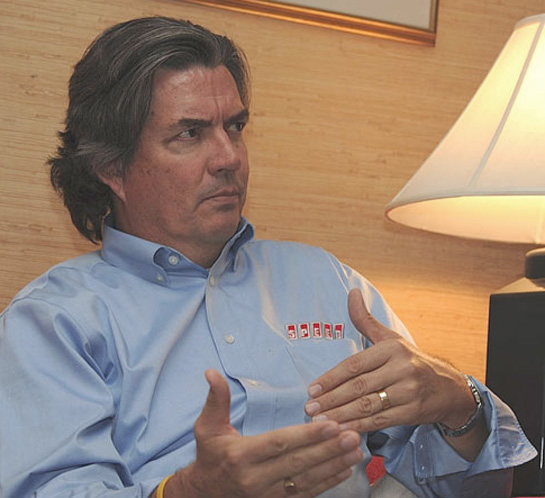
Monterey is a monster event, a fabulous event; you just can’t hope to be comprehensive. We can’t show every car, and we can’t dwell at length on the ones we do show. Obviously the key thing is funding. We all have motorsports events that we would love to do, the way we would like them to be done. But sometimes very hard decisions have to be made. Credit Sidell Tilghman
VeloceToday: There is a niche within a niche for this—Jim Hall, Lance Reventlow, Briggs Cunningham, all great stories and uniquely American, which would be great for Behind the Headlights.
They would be. Unfortunately the commercials drive the bus in TV. You wish it weren’t so, you wish someone could just write a check, but the programs have to help sell products. SPEED was originally conceived as a tiny niche network by Roger Werner, who hoped to reach about 12.5 million homes or so. But then News Corporation bought the network, expanded the format and transformed it into something much larger. Now you have to appeal to a wider audience. It’s not a bad thing, but certainly an evolution of what it was originally conceived to be.
VeloceToday: How might SPEED make the coverage of the Monterey Motorsports Reunion better?
The short answer is more resources, and we’re back to budgets again. People’s expectations of television are rarely seasoned by an understanding of the economic realities of the industry. TV is expensive to do. Monterey is a monster event, a fabulous event; you just can’t hope to be comprehensive. We can’t show every car, and we can’t dwell at length on the ones we do show. Obviously the key thing is funding. We all have motorsports events that we would love to do, the way we would like them to be done. But sometimes very hard decisions have to be made. With Monterey there is also the problem of certain enthusiasts with very deep resources who are also very, very private, so you have to be careful about what you shoot—and what you don’t. And a lot of people, wealthy or not, just don’t want to be bothered; they don’t want the publicity. Sometimes the opposite happens. But we do the best we can within the constraints we have.
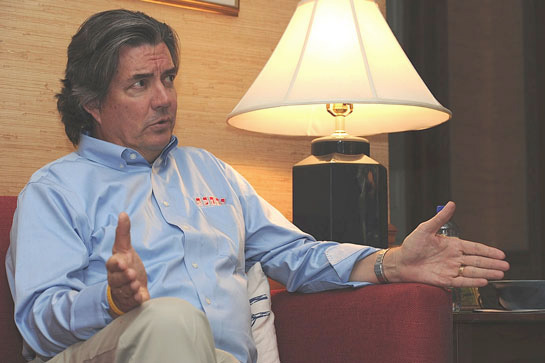
As the audience gets more segmented, it gets very difficult to assemble the right kind of viewership to make it economically successful…it is a really difficult industry. We all live in a time of decreasing ratings—people are spending less time watching TV. Credit Sidell Tilghman
VeloceToday: Tell us about the venture with BJ Auctions.
Years ago, when we first started doing the Barrett-Jackson auctions, some car-collecting purists were bent out of shape about it. “People are spending stupid amounts of money on cars just to be on television,” or “You’re letting these entire people take an inside look at a world we would like to be kept demure, quiet.” TV’s arrival on the auction scene was not without a certain amount of friction. But now there are other auctions on TV. Bottom line, I think that’s a natural outgrowth of the industry; these auctions are making the hobby grow. BJ is expanding the hobby, selling a wide selection of cars. The BJ shows rate very well: people appear to like the auction scene and find it fascinating for the same reason I do: these are real people buying real cars with real money, even though some may not like all the cars presented, or whether or not the cars are ever driven or put in a glass case somewhere.
VeloceToday: Why don’t you start your own cable station that caters to the needs of the rest of the car community (and do it with your classy style)? But can that be done given the current importance of ratings?
(Laughing)—I really think that as an industry we need to reassess what ratings really mean. Are they valid? When I see that some show with a big star gets cancelled because they only get, say, an eleven rating. At SPEED, we’re fighting to score in the low single digits! We need to reassess what a good audience is; the point is not just sheer eyeballs divided by two. It’s the quality of the demographic you deliver. I think sponsors need to keep that in mind when thinking of return on investment. It’s very difficult with television viewership in decline.
As the audience gets more segmented, it gets very difficult to assemble the right kind of viewership to make it economically successful. From a personal perspective, there is increased pressure on the commentators to talk about what they’re seeing in a way that casts a nice wide net and attracts a reasonable audience. It is a really difficult industry. We all live in a time of decreasing ratings—people are spending less time watching TV. But last year the F1 ratings were up. And hopefully, if the Austin, Texas F1 event happens, that would be great for the ratings.
VeloceToday: What is your most memorable experience in motorports coverage?
Two, really. The first was in 1989, when the Walkinshaw Jaguars won at LeMans for the first time in over 30 years. That’s when I realized that Le Mans really is a British race held on French soil. It’s the closest I’ve ever been to bursting into tears on the air, watching how much it meant to the enormous crowd of British spectators seeing the Jags win again at Le Mans.
The other event I’ll never forget was 1994 at Imola, when Ayrton Senna was killed. It was not only Senna’s death, but Roland Ratzenberger was killed in qualifying and Rubens Barrichello was almost killed in a wreck in practice. Then at the start there was the crash in which Pedro Lamy ran into the back of JJ Lehto’s Benneton. Late in the race a wheel came loose from Michele Alboreto’s Minardi striking two Ferrari and two Lotus mechanics, who then needed hospital treatment. It was just the blackest weekend I could ever remember in any form of motor racing.
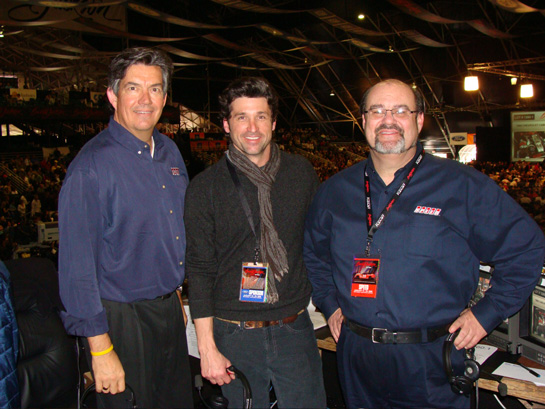
At the 2008 Palm Beach Barrett-Jackson Auction event, Patrick Dempsey (center) joined Motor Trend Classic magazine editor Matt Stone and Varsha in the announcer's booth. Credit SPEED
VeloceToday: The most memorable driver you have ever known…
There have certainly been lots of memorable people I’ve met in racing, and I’m lucky that I can call some of them friends, such as Mario Andretti, Dan Gurney, and Brian Redman. I’ve felt Richard Petty’s finger in my chest for getting in his way while documenting his 1000th Cup start, and I’ve been taught disdain for “store-bought parts” by Big Daddy Don Garlits. Then there’s David Hobbs, who is like a brother and with whom I have worked nearly as long as the 28 years I’ve been married to my wife, Karen.
But if I had to pick one character, it would have to be Senna. I interviewed him several times during his career, and his complex personality came through every time. Everything he did in life was defined by his own set of rules, and he could be chilly unless you were a friend, such as Gerhard Berger. I could never quite figure that relationship out: Senna the devout Christian, and Berger the ultimate lothario.
But if Senna agreed to do something, if you had a deal, he gave you his best. And every now and then he would do something unexpected. For example, when Derek Daly became my on-air partner at ESPN for the 1993 F1 season, he and I stopped by the McLaren garage at the season-opener at Kyalami in South Africa to say hello to Michael Andretti. While we waited for Michael to appear, Senna suddenly stepped from the garage to shake hands with Derek, and I realized immediately that he saw Derek as a fellow driver, a peer. That’s likely the same reason Senna phoned to congratulate Michael, who had such a rough experience in F1 in ’93, when he won the first race of his return to Indycars the following season.
VeloceToday: How would you compare Senna to Schumacher?
Senna and Schumacher are kindred spirits in a way. Senna was by far a more spiritual guy, devout Christian. Prost once said that this was Senna’s great weakness; Senna figured that he was such a God fearing man, God would never allow anything to happen to him, and that explained a lot about his aggressive driving. Both Schumacher and Senna were ruthless on the track but very generous off it; both gave generously to benefit people in their home countries. I think in many ways they had similar personalities, though Schumacher was the Teutonic, cold German, Senna the fiery Latin, but both had something that no one else did. Martin Brundle once said that Schumacher was able to drive with a lot less of his brain power engaged than others, which gave him the ability to think about many other factors in the race than just his driving.
VeloceToday: Is there anyone with those skills today?
Ignoring that Schumacher is back, aside from that, no. Vettel is not the finished product; he is still very young. I’ll be really interested to see how Vettel conducts himself this year. Certainly last year he won the championship in a most dramatic fashion and hopefully he’ll become the leader that Senna and Schumacher were.
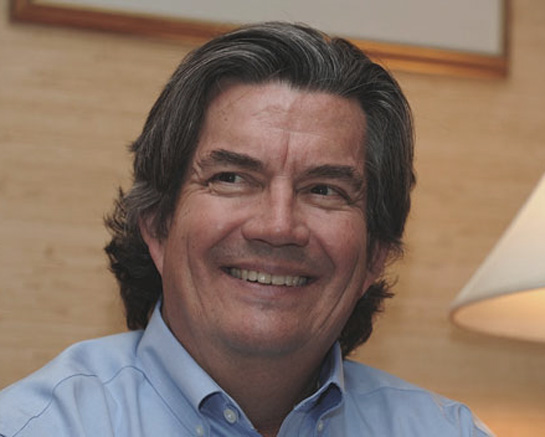
My most memorable auction experience…You mean other than the Playboy Playmate who came on stage with one of Carroll Shelby’s creations to say that she really loves this car and whoever buys it, I want visitation rights? Credit Sidell Tilghman
VeloceToday: What is your most memorable auction event?
(Laughing)…other than the Playboy Playmate who came on stage with one of Carroll Shelby’s creations to say that she “really loves this car and whoever buys it, I want visitation rights?” The number of hands that went up literally quadrupled. When the GM Futurama bus was sold for something like three million, the consigners just went gaga; they would have been happy with a half a million. But it’s not always the big numbers. I’ll never forget a husband and wife from the Midwest who consigned a beautifully maintained ‘54 Chevy Bel Air they’d owned since he courted her. Watching their car roll off the block after it was sold, the two of them were just in tears. Moments like that are unforgettable.
VeloceToday: Is your son still racing?
My son Matt is not racing right now; he’s a ski instructor at Jackson Hole, Wyoming… pretty cool for a guy right out of college. I think he’d love to go back to racing but he’s knowledgeable enough about the profession to realize that without a huge check a career today is unlikely.
VeloceToday: What will you do when you retire?
I can retire, the last time I checked, when I’m 137, at the rate I’m going. But I can’t imagine what I’d do in retirement. I recently had six weeks and I just about went crazy.
Read Part I
About Bob Varsha
Varsha grew up in Northport, New York, thinking he might be happy as a small town lawyer. He attended Dartmouth College in New Hampshire, then went south to Emory School of Law in Atlanta, where he graduated in 1977. His interest in sports and cross country running led him to participate in marathons. After law school, Varsha was asked to help organize the Peachtree Road Race running event. That led to an entrée into TV, as one day CNN called and asked if he would help televise the Peachtree event. That went well despite his long hair, mustache and a checkerboard three-piece suit. CNN called a few weeks later to offer Varsha a job doing overnight news watches, and later CNN morning news on radio. Then CNN Sports called, and he did a series called Motorweek Illustrated. After four years with Turner, he covered IMSA racing at ESPN for a decade, then on to Speed in 1999.
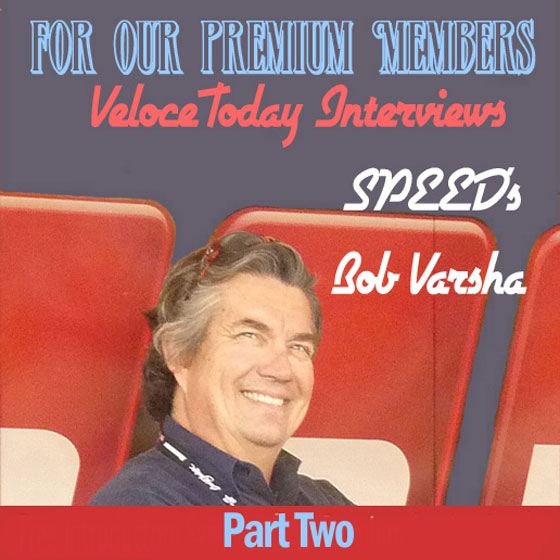
Great interview! Thanks, guys.
Nice to get to know a little more about my favorite motor sport reporter and
neighbor up the road. I have enjoyed his good work for a number of years now.
After watching the BBC boys cover Australia, I believe we got the Best of the Brits.
Bob and David, Steve and Will do a Superior job. I do miss Peter on the Grid though.